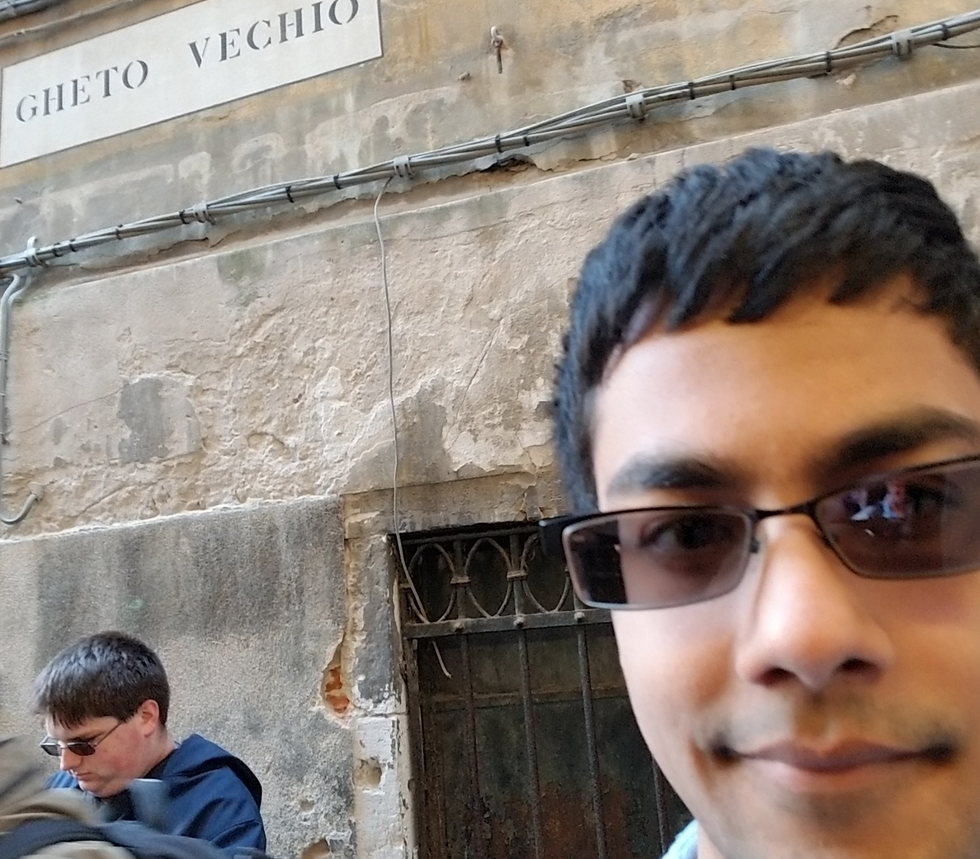One of the "unsung treasures" I had to visit for my HON 110 class in Italy was the ghetto in Venice. It wasn't too hard to navigate to, being confined to an island and avenue in the northwestern area of Venice. It was actually quite easy to find despite the labyrinth that is Venetian streets because it had gates that would block the entrance to the avenue after sundown, which other Venetian streets lacked. My group ended up going through the southern entrance to the ghetto, "Via Ghetto Vecchio," which led to a synagogue, according to my map.
While inside the ghetto, I noticed that in contrast to the cheery bright and vivid colors that Venice is known and acclaimed for, the houses in the ghetto were in a state of disrepair, with grayer, cracked, and peeling paint and a duller atmosphere that pervaded every inch of the neighborhood. The ghetto used to be filled with buildings up to seven stories high due to the immense crowding of Jews into the limited homes.
I saw a Jewish family go to near the synagogue and felt immense pity at what the Jews had to face when living here until the anti-Jewish laws in Venice were abolished. However, walking past the synagogue and through the neighborhood to the next unsung treasure in Italy sparked so many memories that nearly overwhelmed me.
I remember in tenth grade when I read "The Merchant of Venice," a play by William Shakespeare that takes place in, you guessed it, Venice. It was a fantastic play and one of the best works of literature that I have ever read. It takes place in the 1500s when Venice was rooted with so much anti-Jewish sentiment and the general plot of the play is that Antonio, a merchant, needs money to give to his friend Bassanio, who wishes to woo over the beautiful Portia in the town of Belmont.
However, Antonio himself has investments out at sea, and they won't return until later, so he goes to a Jewish man named Shylock, who initially denies him the money, as Antonio has spat on and ridiculed him for simply being a Jew. After enough convincing, Shylock gives Antonio the money, under the condition that should he default, he'll lose a pound of his own flesh to Shylock. Unfortunately, his ships become lost at sea and Antonio can't repay the money, so Shylock takes him to court.
After his own daughter Jessica converts to Christianity and elopes with a Christian named Lorenzo and steals a large sum of his money, Shylock has already suffered immensely. When Bassanio eventually marries Portia, he finds Antonio's life at stake and offers Shylock twice the amount of the loan, which he refuses. Portia then disguises herself as a lawyer and preaches about the quality of mercy, yet defeats Shylock by stating that since he already refused the offer of money, he can't renege on his promise to take a pound of Antonio's flesh.
Due to the deal, he has to remove exactly one pound of flesh, but if he removes too little or too much, or if any blood drops, he will be sentenced to death and all his property will be confiscated. Furthermore, his life was then in jeopardy when Portia says that as a Jew, Shylock is not a citizen, and for nearly taking the life of Antonio, a citizen, he would be at the mercy of the Duke. The Duke pardons Shylock's life but forces him to give up half of his assets to Antonio and Jessica and Lorenzo and the other half to the state, and he is forced to convert to Christianity, destroying what remaining identity he held onto.
Memories of reading the play flowed through my cortex as I simply felt pity for what Jews had to go through during these periods of active antisemitism. I couldn't fathom why the Jews were treated so poorly, especially given Shylock's extremely bad luck with Antonio and company. In my eyes, Shylock represented the Jewish people in Venice in terms of suffering at the hands of other Christians and his rage is the manifestation of the rage directed at the general populace by the Jews for the vast injustice done to them.
I truly believe that discrimination against any one group, especially antisemitism, is unjust and should be condemned whatsoever. The emotions that I felt included rage at the injustice done to Shylock and sympathy for him for his extreme suffering. The ghetto, which I believe as the neighborhood of Venice, enabled me to remember the play and further sympathize for Jewish people in general.









































